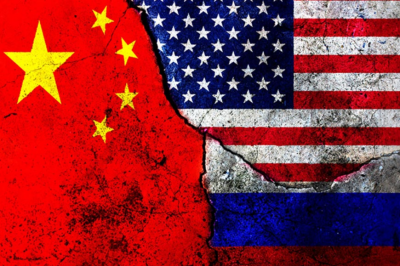Recently, we are seeing updates in the international news on what is happening in the Red Sea. Why is the Red Sea getting so much attention, and what is its significance? Also, what stakes do international powers have in the region? The above are some of the questions that will be addressed in this article, but before that, having an overview of how international giants act in the state of the Cold War and why some relatively small actors (can be state or non-state actors) get involved in the war is important.
After World War II, the world was divided into two big blocs: the Communist bloc led by the USSR and the Capitalist bloc led by the USA. These two blocs were fighting an ideological war and were struggling for the prevalence of their respective economic ideology.
In this war, the states outside the boundaries of the USSR and the USA had to decide if they wanted to join either of them or remain neutral. Some states allied with the USA and Pakistan, for instance, by signing pacts like SEATO and CENTO. At the same time, some joined the communist bloc, China, for instance, and some states remained neutral by joining the Non-Alignment Movement (NAM); one of the states that joined NAM was India.
Alliances are made based on mutual interests. In the last century (1945-91), when alliances were made to fight the Cold War, mutual benefits encouraged the member states to offer what other members wanted. Many paid huge prices for offering their geo-strategic, human resources, or other assets, but that is a discussion for another time. So that’s how states acted as members of their desired bloc.
Something similar has been repeated recently; the only difference is that the protagonists are changed. In the past, when the U.S. was fighting with the USSR, she has now come head to head with another international economic giant called China. Fighting China can comparatively be much more challenging than it was in the case of the USSR; the reason, from my point of view, is China’s economic policy.
Also Read: Pakistan Praises UN Resolution for Gaza Ceasefire
China plays smart cards to show performance in the economic realm. Chinese foundations might lay on communist principles, but she can become a capitalist if her economic prosperity demands it. Both the economic giants, one having dominancy in the global North and the other struggling to dominate the global South, must succeed in the economic realm.
Being well aware that in the globalized world, it is crucial to be connected to other actors outside one’s boundaries, China does not seem to compromise any geo-strategic advantage. For that, she is following the same alliance-formation strategy. More precisely, she does not hesitate to use even militant organizations like Houthis to achieve their political and economic goals in unavoidably beneficial domains like the Red Sea.
The significance of the Red Sea is too great to ignore. Over 10 % of global trade flows through the region. The region has crucial strategic passages, like Bab-al-Mandab in the South and the Sues Canal in the North. These passages provide a key sea route for commercial trade between Europe and Asia. Considering its significance, the Red Sea has to be secured for economic and strategic purposes.
As mentioned earlier, a non-state actor is in the limelight, and parallels are drawn between alliance formation in Cold War 1.0 and China shaking hands with the militant organization called the Houthi organization. The Shia Islamists led the Houthi movement from Yemen.
This political and military organization is in arms against the Yemeni government. Charged by the sectarian conflict, the Houthis are of the view that the U.S. installed the Yemeni government to secure her interests in the region and this messy game; KSA is a partner of the U.S. government.
Following an old political rule, “enemy of my enemy is my friend”, the Houthis are now joining hands with China to eradicate the US-implanted government in their home state. What compelled them to choose China against the U.S. and her Sunni ally, the Kingdom of Saudi Arabia, is a recent conflict between Israel and Palestine.
The escalation of the war to the point of genocide sparked hatred so much that now Houthis are ready to go to any extent to counter Israel and her all-weather friends, the USA. China allowed this militant organization to fight their enemy (might be perceived), which also serves her big goals in the region. Till now, the Hamas-backed Houthis have targeted more than 60 commercial ships in the Red Sea.
By connecting the dots, we can conclude that big powers are confronting each other economically and striving to defeat the other party. In this Cold War, some actors were being used to serve one of the bloc’s interests, and many were getting offers to do the same. What non-warring states can do is learn some lessons from the Cold War 1.0 and avoid joining either of the camps unless their participation is more vital for their national interest than for the other party.

The writer has done bachelors studies in international relations from university of Peshawar and is currently working as a research assistant in Public Relation services.







